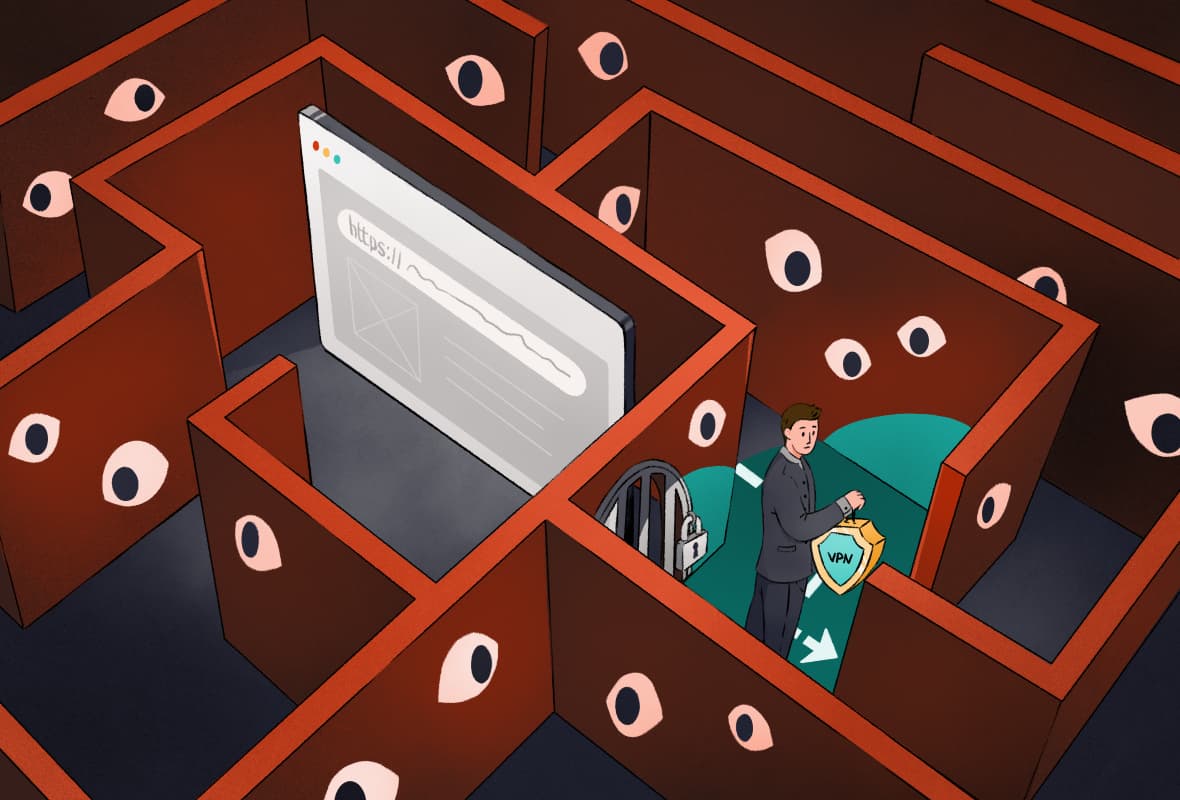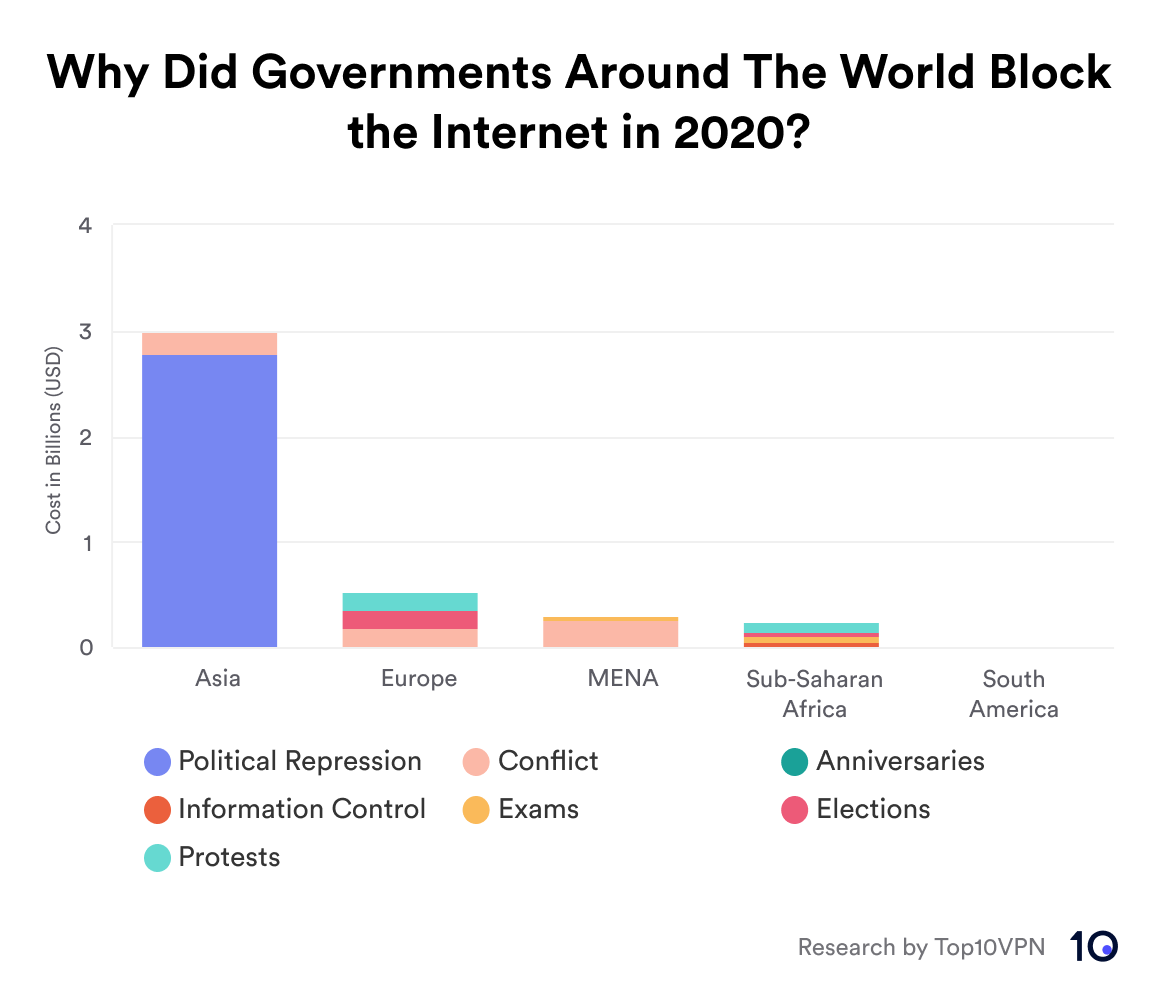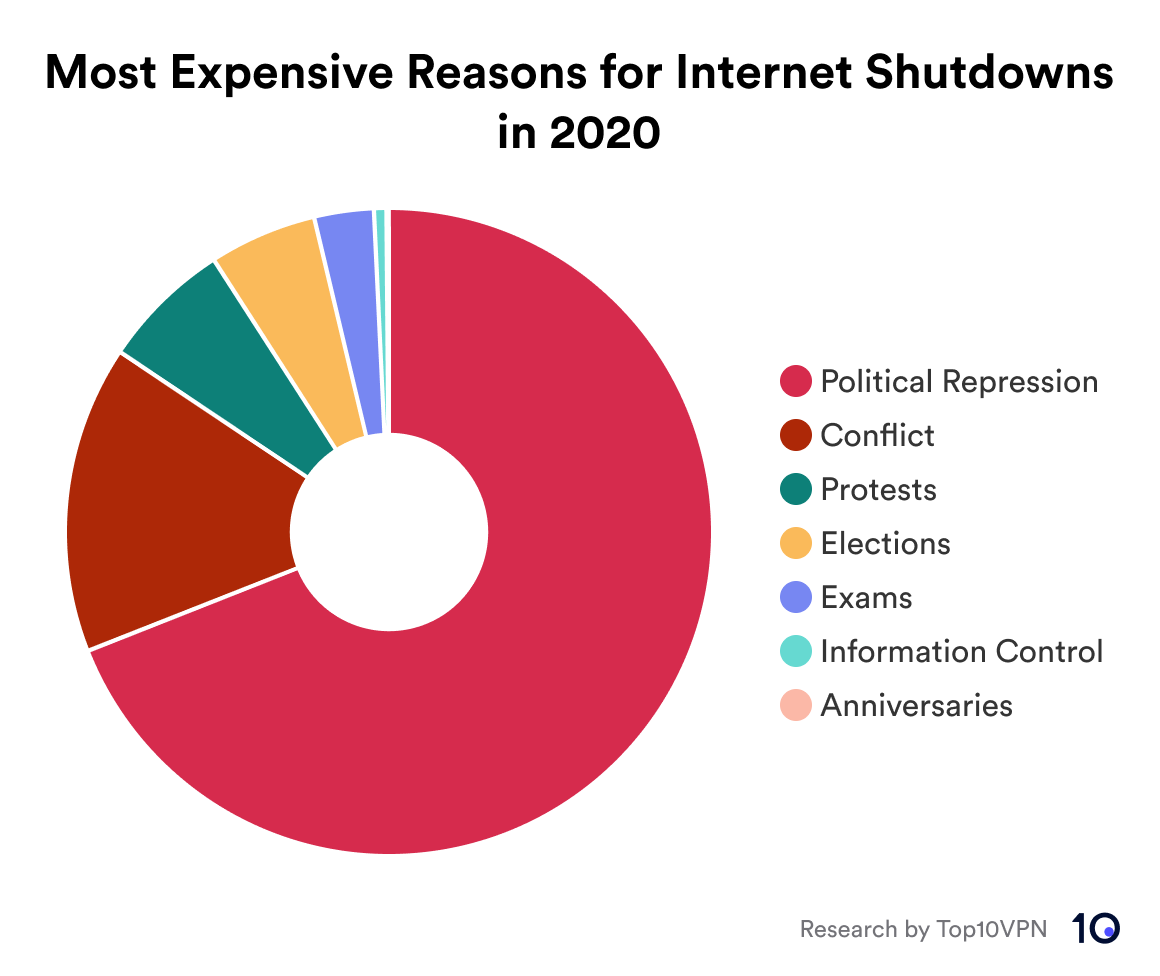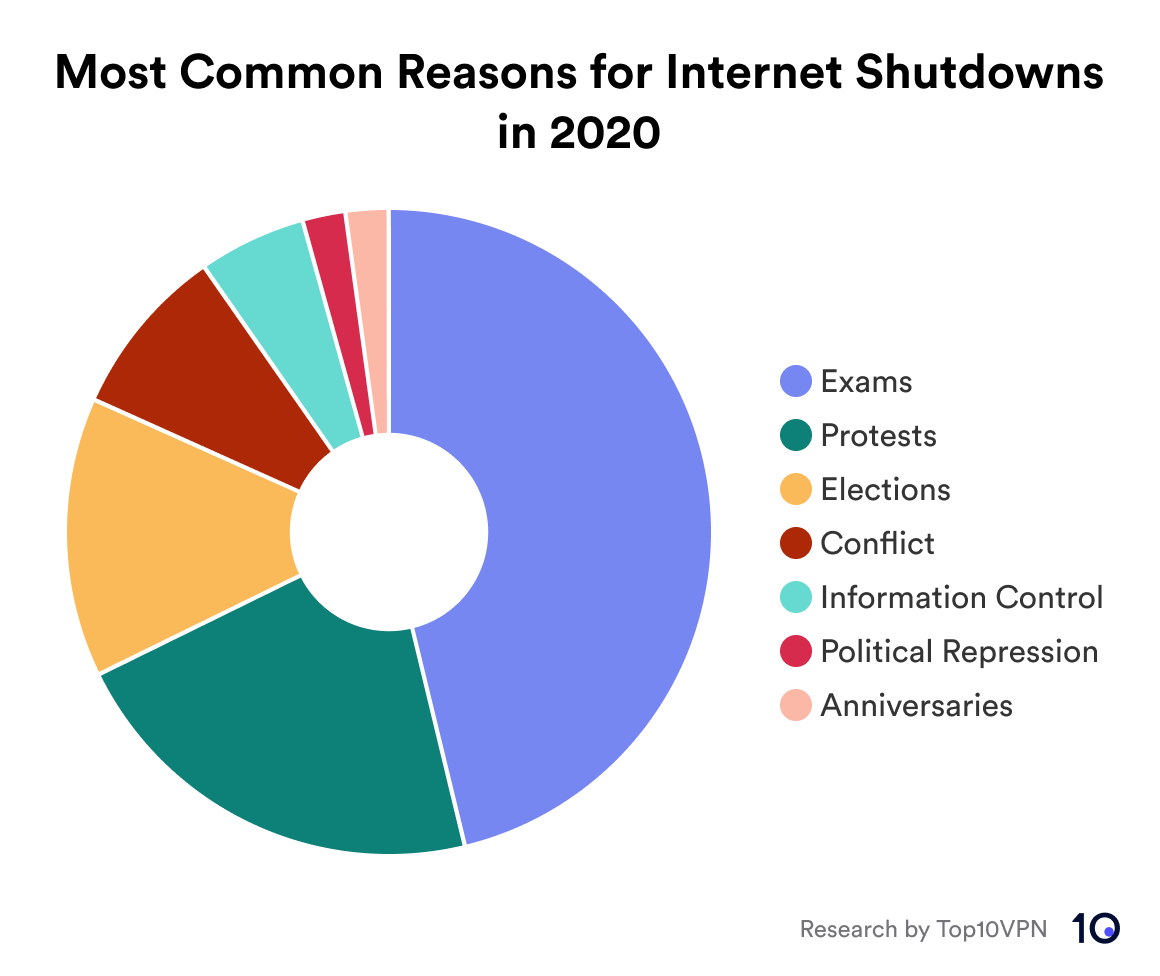Government Internet Shutdowns Cost Over $4 Billion in 2020
Our annual report analyzes every major intentional internet shutdown in 2020 and reveals that they cost the world economy $4 billion.

This is our most recent annual report on the cost of government internet shutdowns. For the latest real-time data and links to other historical reports, see our the main Global Cost of Internet Shutdowns page.
Internet Shutdowns: Economic Impact in 2020
- $4.01 billion: economic cost of internet shutdowns globally in 2020, down by 50% from 2019
- 93 major internet shutdowns took place in 21 countries in 2020
- 27,165 hours: total duration of major internet outages around the world, up 42% from the previous year.
- Internet blackouts: 10,693 hours
- Internet throttling: 10,920 hours
- Social media blocks: 5,552 hours
- 268 million people affected by deliberate internet disruption in 2020, up 3% year-on-year
- India: experienced the most costly internet shutdowns, with a loss $2.8 billion
- Human rights impact: 42% of government internet outages were associated with additional human rights abuses:
- 29% of all internet disruptions were also associated with restrictions on freedom of assembly
- 15% with election interference
- 12% with infringements on freedom of the press
How We Track The Impact of Internet Shutdowns
This Global Cost of Internet Shutdowns in 2020 annual report calculates the total economic impact of every major internet blackout and social media shutdown around the world that year.
This report expands on our 2019 report into the cost of governments using DNS-filtering technology to block internet access.
To determine the global cost of government internet outages, we collated every national and region-wide incident around the world, determined the duration of the restrictions and used the COST tool to calculate their economic impact.
This tool, developed by internet monitoring NGO Netblocks, uses indicators from the World Bank, ITU, Eurostat and US Census.
We found that there were over 27,000 hours of deliberate internet shutdowns around the world in 2020, which cost the global economy $4.01 billion. This represents a 50% decrease in economic impact compared to $8.05 billion in 2019.
Jump straight to economic impact data by region, country and by context.
Intentional major disruptions to internet access lasted over 40% longer in 2020 than they did in 2019. However, as these internet outages were mainly concentrated in poorer regions this resulted in a lower overall economic impact.
The longest government internet shutdowns in 2020 were again in India and Myanmar. In both countries, internet restrictions originally imposed in 2019 continued throughout 2020. The Chad government again restricted access to WhatsApp after blocking the app for more than a year in 2018/19. Combined, these three countries experienced a total 64% increase in the number of hours of deliberate internet restrictions in 2020.
What Is An Internet Shutdown?
We use the definition from Access Now: “An internet shutdown is an intentional disruption of internet or electronic communications, rendering them inaccessible or effectively unusable, for a specific population or within a location, often to exert control over the flow of information.”
In this report, we include social media shutdowns, internet blackouts and severe throttling in our calculations. These types of internet disruption are defined as follows:
- Internet blackouts: internet access is completely cut off. This extreme censorship measure cannot be directly circumvented. We have included partial internet blackouts, i.e. on specific Internet Service Providers (ISPs), and modified our calculations accordingly in such cases.
- Social media shutdowns: access to social media platforms, such as Facebook, WhatsApp, Twitter or YouTube, is blocked. This can typically be circumvented by using a VPN service.
- Severe throttling: internet access has been reduced to 2G speeds, which permits the use of SMS and voice calls but renders modern websites and apps functionally unusable. This is an internet blackout in all but name.
Internet Shutdowns By Region
The following data table shows the total economic cost of all major internet shutdowns in 2020 broken down by the global region where the disruptions occurred. The data table is ordered from greatest to least economic impact, measured in USD.
The bar chart below shows the economic impact of all major internet shutdowns in 2020 on each of the global regions where the disruptions occurred, broken down by context, i.e. the reason why the internet outage was implemented.

Bar chart showing the most expensive reasons for internet shutdowns in 2020 by global region.
Internet Shutdowns By Country
The following table shows the total economic cost of all major internet shutdowns in 2020 by country where the disruptions occurred. Ranking is greatest to least economic impact, measured in USD.
The table also indicates the nature of any additional human rights abuses perpetrated during each shutdown. A cross indicates that the human right specified was violated.
Click on the country name to jump to background information about the individual incidents of disruption.
Internet Shutdowns By Context
The following data table shows the total economic cost of all major internet shutdowns in 2020 grouped by context, i.e. the nature of what prompted the authorities to cut internet access. The data table is ordered from greatest to least economic impact, measured in USD.
The data table also indicates the number of incidents in each category and the total duration of deliberate internet outages in hours.
The following chart shows split of the economic cost of all major government internet outages in 2020 by context, i.e. the nature of what prompted local authorities to cut internet access.

Donut chart showing the reasons for internet shutdowns in 2020 with the most economic impact
The following chart shows the split of reasons for all major government internet outages in 2020 by frequency.

Donut chart showing the most common reasons for internet shutdowns in 2020
Internet Shutdowns in 2020: Country by Country
The following sections of the report examine the circumstances around each instance of governments cutting or restricting access to the internet.
We have looked at each country individually and broken out the duration of each type of internet outage. We have also identified the nature of any additional human rights abuses in each country associated with the government internet outages.
Countries are ordered and grouped according to the overall economic impact of their government’s internet restrictions over the course of the year.
Use the following links to jump straight to the relevant country-by-country section:
- Internet shutdowns costing over $500 million
- Internet shutdowns costing $100-$250 million
- Internet shutdowns costing $10-$100 million
- Internet shutdowns costing $1-$10 million
- Internet shutdowns costing under $1 million
Internet Shutdowns With Over $500 Million Cost
India
- Internet blackouts: 1,655 hours
- bandwidth throttling: 7,272 hours
- Total cost of internet outages: $2,779.3 million
- Human rights abuses: Right to peaceful assembly & freedom of press
India continued to deliberately cut internet access more than any other country: over 75 times in 2020.[1] Most of these short internet outages were highly-targeted, affecting groups of villages or individual city districts and so were not included in this report, which focuses on larger region-wide internet shutdowns. The true economic cost is therefore likely to be even higher than the $2.8 billion we have calculated.
In Kashmir, authorities lifted internet restrictions in March 2020,[2] seven months on from the controversial move to strip the region of its autonomy. However, even after internet access was restored, authorities continued to severely throttle internet speeds, with citizens only able to access 2G connections.
“The limiting of networks to 2G has made it impossible for online classes to function adequately. Graduate students and teachers have been unable to participate in conferences or have their papers published, causing willful harm to their careers and violating the rights to education.” – Human Rights Watch[3]
Belarus
- Internet blackouts: 218 hours
- Total cost of internet restrictions: $336.4 million
- Human rights abuses: Right to peaceful assembly, election interference, press freedoms
Authorities in Belarus cut internet access in August and September to try to stifle protests following a controversial presidential election, whose results were described as “falsified” by the international community.[4]
In response, protesters turned to privacy apps including Telegram and VPN services to continue organizing protests.[5] During the period of internet restrictions, we documented a 650% spike in VPN demand. Such demand is typically focused on popular free VPN services, many of which are unsafe.
Internet Shutdowns With Costs of $100-$250 million
Yemen
- Internet blackouts: 912 hours
- Total cost of internet restrictions: $236.8 million
Damage to an undersea cable reduced Yemen’s internet capacity by 80% in January. Some have claimed it was a deliberate act of sabotage, however this allegation remains unconfirmed.
“Regardless of who or what is responsible, Yemenis were effectively cut off from one another and the rest of the world.” Access Now said in a statement.[6]
Myanmar
- Internet blackouts: 5,160 hours
- Bandwidth throttling: 3,648 hours
- Total cost of internet restrictions: $189.9 million
- Human rights abuses: Press freedoms
Internet outages in the Chin and Rakhine regions of Myanmar continued in 2020, with an internet blackout continuing until early August. However, even after internet access was restored, authorities continued to throttle internet speeds.
In an article for TIME magazine, Kyaw Hsan Hlaing, a student, activist and freelance journalist from Rakhine State, described how the restrictions had impacted people’s livelihood: “Although 2G services were restored this August, 3G and 4G networks remain blocked in all but one of the affected townships, leaving people unable to perform a basic internet search.”[7]
Azerbaijan
- Social media shutdowns: 1,128 hours
- Total cost of internet restrictions: $122.6 million
- Human rights abuses: Press freedoms
Azerbaijan authorities blocked access to Facebook, WhatsApp, YouTube, Instagram and Twitter from late September into November as conflict broke out with neighbouring Armenia over the contested territory of Nagorno-Karabakh.[16]
During the period of the internet outages, we documented a 1,646% increase in VPN demand as citizens attempted to circumvent the internet censorship.
Ethiopia
- Internet blackouts: 1,536 hours
- Total cost of internet restrictions: $111.3 million
- Human rights abuses: Right to peaceful assembly, election interference, press freedoms
For more than three weeks between June and July, internet access in Ethiopia was cut off as protests swept the country following the killing of a popular singer.[9][10]
This internet outage was followed by another communications blackout in the Tigray region after violent conflict broke out in November.
Internet Shutdowns With $10-100 Million Cost
Sudan
- Internet blackouts: 36 hours
- Total cost of internet restrictions: $68.7 million
Authorities in Sudan once again restricted access to the internet in 2020 after similar internet outages cost the country almost $2 billion in 2019.
The Sudan authorities said they cut access to the internet to stop students from cheating during exams.
According to a report by Global Voices: “The mechanism used for this shutdown – disabling mobile data – was the same one used in the 2019 shutdown, when local internet services provides (ISPs) in Sudan only disabled the access point name or APN.”[11]
Turkey
- Social media shutdowns: 18 hours
- Total cost of internet restrictions: $51.1 million
The Turkish government blocked access to Facebook, WhatsApp, YouTube, Instagram and Twitter following an attack against Turkish troops in Syria in February.[12]
The internet outage led to a surge in demand for VPN services, which increased by 810% during the social media blocks.
Syria
- Internet blackouts: 79 hours
- Total cost of internet restrictions: $35.9 million
Syria has repeatedly shut down the internet during exam periods, a practice that had began in 2016.[13] In 2020, internet access was cut for 4-6 hour periods in June, July, and August as exams took place.
Tanzania
- Internet blackouts: 264 hours
- Social media shutdowns: 168 hours
- Total cost of internet restrictions: $27.5 million
- Human rights abuses: Right to peaceful assembly, election interference, press freedoms
The Tanzanian authorities blocked access to social media on the eve of the country’s presidential elections in October.
The internet outage meant “Twitter, WhatsApp, backend servers for Instagram and some Google services including Gmail and Translate [were] generally or partially unavailable,” according to Netblocks.[14]
There was also a partial internet blackout in the run up to the election and several days after, with internet access reduced to 90% of normal levels.
Twitter has been blocked since the initial social media shutdown, although the disruptions have not been consistent. During this period, we documented an enormous 18,823% spike in demand for VPNs.
Chad
- Internet blackouts: 672 hours
- Social media shutdowns: 3,936 hours
- Total cost of internet restrictions: $23.1 million
Chad continued its long trend of blocking access to social media and restricting its citizens’ access to the internet.
Authorities tried to justified the most recent internet outage on the basis that it was to prevent the spread of messages “inciting hate and division” after videos of a military officer opening fire on a civilian mechanic began circulating.[15]
Internet Shutdowns With $1-10 Million Cost
Algeria
- Internet blackouts: 2 hours
- Social media shutdowns: 24 hours
- Total cost of internet restrictions: $9.6 million
Algerian authorities once again restricted access to the internet during exams in 2020. A 24-hour social media shutdown was followed by a two-hour internet blackout in September.[16] In response, we documented an 828% increase in VPN demand.
The country has a history of shutting down the internet during exams, with restrictions costing almost $200 million in 2019.
Guinea
- Internet blackouts: 102 hours
- Social media shutdowns: 136 hours
- Total cost of internet restrictions: $6.1 million
- Human rights abuses: Election Interference
Internet access was restricted in March and October 2020 in Guinea during elections. On both occasions authorities implemented social media shutdowns and internet blackouts to prevent the free flow of information and interfere with the democratic process.[17][18]
Our team observed a rise in VPN demand around the time of each vote. In March VPN demand increased by 1,257%, while in October it surged by 3,043%, as citizens prepared for internet outages.
Jordan
- Social media shutdowns: 92 hours
- Total cost of internet restrictions: $4.9 million
The Jordan government blocked seven popular social media platforms: Telegram, Facebook, Viber, Line, Tango, Whatsapp and IMO, daily between 10am and 2pm for much of July, during the country’s national high school exams.[19]
Venezuela
- Social media shutdowns: 2 hours
- Total cost of internet restrictions: $2.4 million
- Human rights abuses: Election interference
State-run internet service provider (ISP) ABA CANTV blocked access to Facebook, YouTube, Instagram, Twitter on Jan 5 2020 as the members of the opposition were blocked from entering the National Assembly ahead of a key leadership vote.[20][21]
This caused a spike in VPN demand by 1,731% as locals attempted to bypass the internet restrictions.
Iran
- Internet blackouts: 9 hours
- Total cost of internet restrictions: $2 million
- Human rights abuses: Right to peaceful assembly
In July, October and November, authorities in Iran briefly cut citizens’ access to the internet. While the overall cost of these internet outages was not comparable with the previous year, hundreds of thousands of people remained cut-off from the internet during politically sensitive moments.[22][23][24]
Internet Shutdowns With Costs of Under $1M
Iraq
Internet access was cut for 8 hours in the Kurdish region of northern Iraq’s Sulaymaniyah province on December 7 following clashes between protesters and security forces.[25][26]
Somalia
Internet access was cut off for 31 hours in Somalia over July 26-27.[27] The internet blackout began following the unexpected removal of long-serving Prime Minister Hassan Ali Khaire.[28][29]
Burundi
Authorities in Burundi blocked access to social media in August as citizens went to the polls. Twitter, Facebook and WhatsApp were all affected during the 48-hour restriction.[30] During this period, we recorded a 5,686% spike in demand for VPN.
Kyrgyzstan
A partial internet cut followed after protests broke out in the Kyrgyz capital Bishkek, due to alleged election interference in Kyrgyzstan’s recent parliamentary elections. [31][32]
Togo
As the polls closed on election day, restrictions were placed on Facebook and WhatsApp through Togo’s main state operator, Togo Telecom.[33]
Internet Shutdown Research Methodology
We reviewed every documented internet and social media shutdown globally in 2020. We included national shutdowns along with regional disruptions that on a sufficient scale to be economically significant. For the purposes of this research, internet outages due to natural disasters or infrastructural failures were not included, nor were outage days prior to 2020 for ongoing incidents.
Shutdown nature, duration and severity was sourced from Netblocks real-time graphic data and reports, IODA and the SFLC.IN Internet Shutdown Tracker. Additional open-sourced information used came from Access Now and reputable news reports.
Shutdown costs were derived from the Netblocks Cost of Shutdown Tool, based on the Brookings Institution method. Regional shutdown costs were calculated by determining the region’s economic output as a proportion of national GDP.
Regional shutdown costs were calculated as a proportion of national costs, based on a region’s economic contribution to national GDP. In the case of Myanmar, where official regional GDP data was not available, costs were based on the internet users in the affected area as a proportion of total internet users.
Mobile-only or carrier-specific outages were calculated as a proportion of the above costs based on the most up-to-date market-share information publicly available.
Internet user data sourced from the World Bank and government reports.
Download the 2020 cost of internet shutdowns data sheet as a Google Sheet or as a PDF.
Additional research by Christine O’Donnell
The authors of all our investigations abide by the journalists’ code of conduct.
References
[1] https://internetshutdowns.in/ ↩
[2] https://www.dw.com/en/india-restores-internet-access-in-kashmir-with-conditions/a-52643554 ↩
[3] https://www.hrw.org/news/2020/08/04/india-abuses-persist-jammu-and-kashmir ↩
[4] https://www.gov.uk/government/news/uk-calls-for-fresh-presidential-elections-in-belarus ↩
[5] https://www.dw.com/en/in-belarus-privacy-apps-help-resist-internet-shutdown/a-54560843 ↩
[6] https://www.accessnow.org/keepiton-as-yemens-war-goes-online-internet-shutdowns-and-censorship-are-hurting-yemenis/ ↩
[7] https://time.com/5910040/myanmar-internet-ban-rakhine/ ↩
[8] https://www.theguardian.com/world/2020/dec/10/human-rights-groups-detail-war-crimes-in-nagorno-karabakh ↩
[9] https://netblocks.org/reports/internet-cut-in-ethiopia-amid-unrest-following-killing-of-singer-pA25Z28b ↩
[10] https://news.un.org/en/story/2020/07/1068781 ↩
[11] https://globalvoices.org/2020/11/09/shutdowns-throttling-and-stifling-dissent-online-africas-new-normal-part-ii/ ↩
[12] https://netblocks.org/reports/social-media-blocked-in-turkey-as-idlib-military-crisis-escalates-r8VWGXA5 ↩
[13] https://twitter.com/InternetIntel/status/1298621788310704130 ↩
[14] https://netblocks.org/reports/internet-disrupted-in-tanzania-on-eve-of-presidential-elections-oy9abny3 ↩
[15] https://www.accessnow.org/shutdownstories-how-chad-fixation-on-social-media-blackouts-hurts-citizens/ ↩
[16] https://netblocks.org/reports/social-media-restricted-and-internet-cut-during-algeria-school-exams-xAGolxAz ↩
[17] https://www.reuters.com/article/us-guinea-election/gunfire-and-barricades-in-guinea-as-president-heads-for-third-term-idUSKBN2781QB ↩
[18] https://freedomhouse.org/country/guinea/freedom-world/2020 ↩
[19] https://smex.org/noexamshutdown-4-mena-countries-shut-down-the-internet-so-far-to-fight-cheating/ ↩
[20] https://www.nytimes.com/2020/01/05/world/americas/venezuela-noticias-guaido-maduro.html ↩
[21] https://www.france24.com/en/20200107-venezuela-s-guaido-sworn-in-as-parliament-speaker-after-stand-off ↩
[22] https://www.amnesty.org/en/latest/news/2020/07/iran-two-kurds-executed-amid-increasing-use-of-death-penalty-as-weapon-of-repression/ ↩
[23] https://www.al-monitor.com/pulse/originals/2020/10/iran-singer-death-protests-mohammad-reza-shajarian-musician.html ↩
[24] https://www.bbc.co.uk/news/world-middle-east-50444429 ↩
[25] https://www.aljazeera.com/news/2020/12/8/iraqi-leader-calls-for-end-to-violence-in-sulaymaniyah-protests ↩
[27] https://www.middleeastmonitor.com/20201211-iraq-8-killed-in-sulaymaniyah-protests/ ↩
[28] https://eeas.europa.eu/headquarters/headquarters-homepage/83408/somalia-statement-high-representativevice-president-josep-borrell-recent-developments-house_en ↩
[29] https://so.usembassy.gov/united-states-concerned-over-irregularities-of-no-confidence-vote-somalias-future-elections-process/ ↩
[30] https://netblocks.org/reports/social-media-disrupted-in-burundi-on-election-day-JBZLPY86 ↩
[31] https://uk.reuters.com/article/uk-kyrgyzstan-protests-election-result-idUKKBN26R1AJ ↩
[32] https://www.bbc.co.uk/news/world-asia-54432030 ↩
[33] https://netblocks.org/reports/social-media-disrupted-in-togo-on-election-day-r8VWr4A5 ↩
Updated Jan 21 2022 to adjust references to 2019 total shutdown duration hours throughout after a small number of data formatting anomalies were discovered in the underlying historical data.